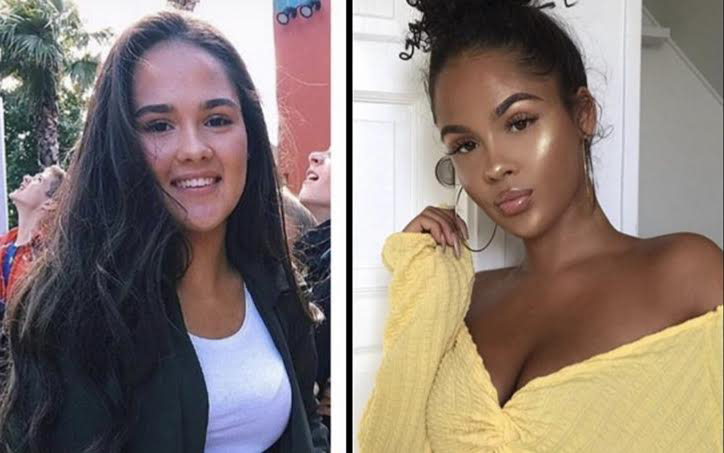Here is a classic phrase: “Everyone wants to be black, until it is time to be black.” We are living in an age of cultural appropriation, selective outrage and ambiguity, which is extremely dangerous.
Earlier this month, Twitter users accused white female influencers of “blackfishing.”
Blackfishing, which is more commonly referred on social media as “N—–fishing,” is the enhancement of the body in an attempt to look like black women. This includes skin darkening, lip filling, hair texturizing and wearing traditional black hairstyles such as cornrows.
These social media influencers are participating in a modern form of blackface. Even though they are not wearing blackface in the way we understand it (Minstrel Show), what they are doing is still problematic.
Not only are black features being exploited for attention and money, but influencers also humanized the look of blackface.
As a result of this, there is a streamline of confusion that is fooling a lot of people.
We typically see this parade of cultural appropriation around Halloween, but blackface, blackfishing and its defense still occurs beyond social media at other times throughout the year, sometimes garnering headlines.
Most recently, Megyn Kelly’s defense of blackface back in October showed the tone-deaf attitudes that still run rampant.
Rachel Dolezal is another example. She’s the white woman who spent years pretending to be a black woman and infiltrated the NAACP before resigning in 2015 in disgrace. Some people, including black people, feel that she is not completely wrong because she was fighting for the “movement.” However, she still pretended to be someone that she is not.
The social media influencers who claim to be “naturally tan” and are posing as black women are doing the same thing: gaining attention through deception.
There have been cases of white people committing crimes in blackface/body. According to the Huffington Post, 26-year-old Cameron James Kennedy, who disguised himself in blackface, was accused of robbing a Las Vegas casino in March.
It should be common knowledge that dressing up to pose as if you are a part of another culture or race is not acceptable.
Those who dabble in blackface/blackfishing without viewing it as wrong are perpetuating the phrase aforementioned, “Everyone wants to be black, until it is time to be black.”
It may be nice to receive praise for black features, but praise is only a small fraction of the black experience.
For those who feel blackfishing is not a big deal and that we black people have “bigger fish to fry” are wrong.
No matter how big or small an issue is, it is still an issue. Blackfishing, blackface and its racist predecessors needs to be addressed and attacked head on in unity.
Blackfishing not being viewed as an issue — especially by those in the black community — allows for “blackness” to be questioned.
Many young black women and men who followed the blackfishing influencers believed that they were black and now feel deceived (and rightfully so), because they innocently supported a caricature of themselves.
Brushing off blackfishing as “not that deep” is a fallacy because blackfishing really is that (skin) deep.











Aurora • May 7, 2021 at 12:22 pm
I don’t understand the big deal with blackfishing. It’s not going out of their way to hurt people. As it said earlier sometimes those people can do good things. It’s not mocking black people like blackface is. Most of the time the people who blackfish aren’t trying to mock, but instead they are insecure about their own looks. Stop taking everything so offensively.
Joseph • Aug 11, 2020 at 2:32 am
This article raises more pressing issues than blackfishing. I clicked on it to discover what blackfishing is only to find a lot of troubling statements.
“We typically see this parade of cultural appropriation…”
Cultural appropriation is just the new way of telling someone they can’t do something because of the color of their skin. It has nothing to do with culture. A new form of racism for the internet age. And the outrage about it is used selectively. The film Black Panther was full of cultural appropriation but instead of outrage, it won an Oscar for it.
“However, she still pretended to be someone that she is not.”
Interesting how in a “Woke” culture that tries to be so inclusive, we still find ourselves trying to exclude people. Trying to tell someone who they are or aren’t. Who they can be and can’t be. Very hypocritical.
“It should be common knowledge that dressing up to pose as if you are a part of another culture or race is not acceptable.”
Telling people what they can and can’t wear is beyond ridiculous. And you can’t own a culture or claim that your culture is pure or untouched by other cultures. Which culture first started wearing pants? Which culture first started wearing closed toe shoes?
Which culture first started cornrows? You can’t definitely say the black culture because there are statues that bring that into question. Just because something has become part of one culture doesn’t mean it wasn’t part of another.
“allows for “blackness” to be questioned.”
Blackness being questioned has become part of black culture. Accepting or denying individuals because of the darkness of their skin, the way they talk, how they dress, and how they act has been going on in the black community for decades now. The Black Draft was a comedic skit by Chappelle so many years ago. Poitier “acting and dressing white”, Cuba Gooding Jr. “not considered black by black people”, the list goes on and on.
“Everyone wants to be black, until it is time to be black.”
Wow, what an arrogant saying. So self-absorbed and out of touch with all the other communities.
“Many young black women and men who followed the blackfishing influencers believed that they were black and now feel deceived (and rightfully so), because they innocently supported a caricature of themselves.”
Following/caring about someone’s opinions because of the color of their skin. And we wonder why our country has issues. Embarrassing.
This article is full of questionable thinking. Until every individual learns to care about all people and not just those that they identify with, racism will stick around and thrive. Caring only about those you identify with does nothing but put us in groups and divide us. White culture, black culture, and American culture all need to change if we want to take a step forward.
Chris • Jul 29, 2020 at 5:25 am
People should be allowed to dress up how ever they want. They’re only influencers if they influence you. If I want to dress up like Michael Jordan for a costume, then I should be able to do so. Intent is important. Not. These unwritten rules about who can say, wear, or talk about certain things.
Ashcan • Dec 20, 2018 at 2:52 pm
Blackface has racist origins and is a HATE symbol, a hate symbol has no expiration date.
There is NO SUCH THING as NOBLE blackface.